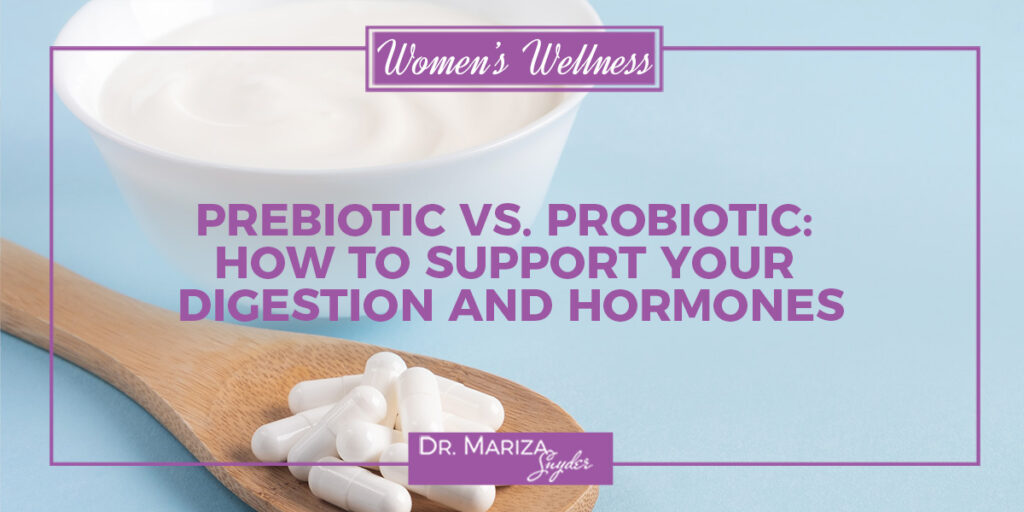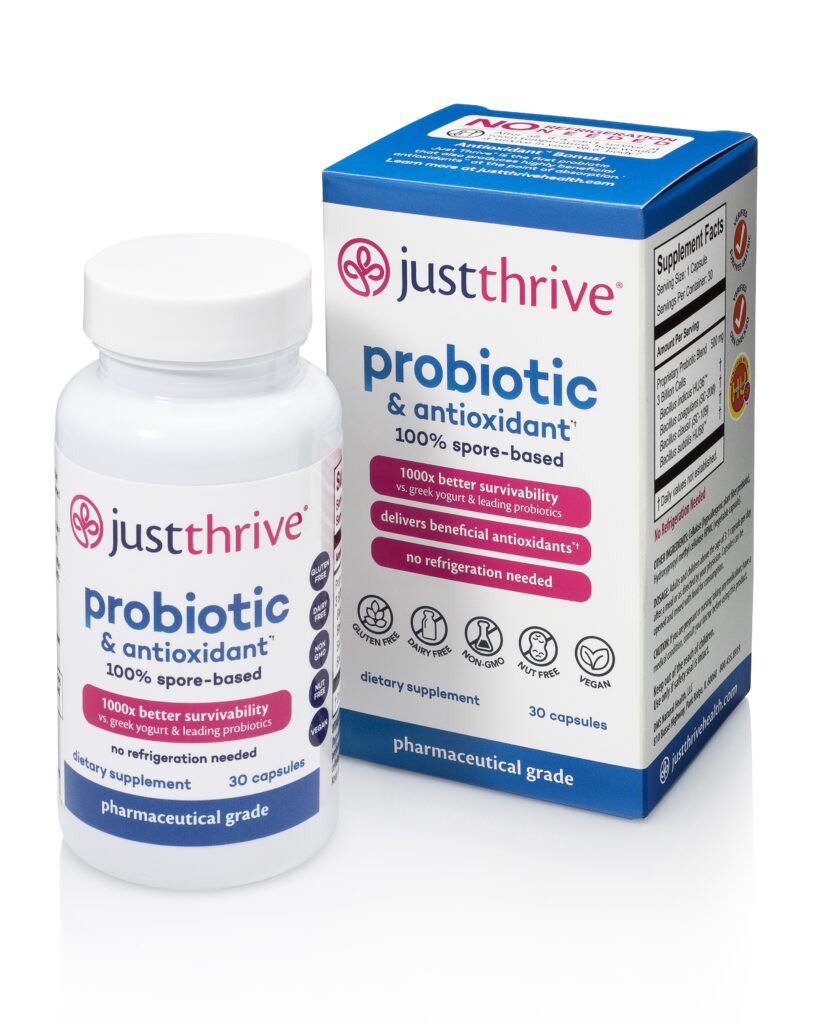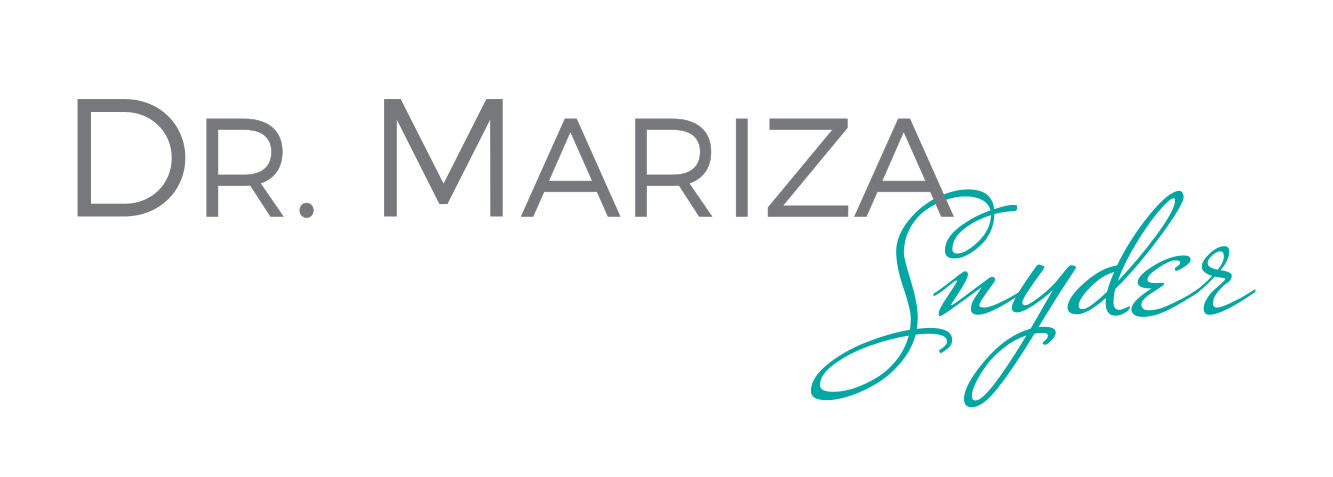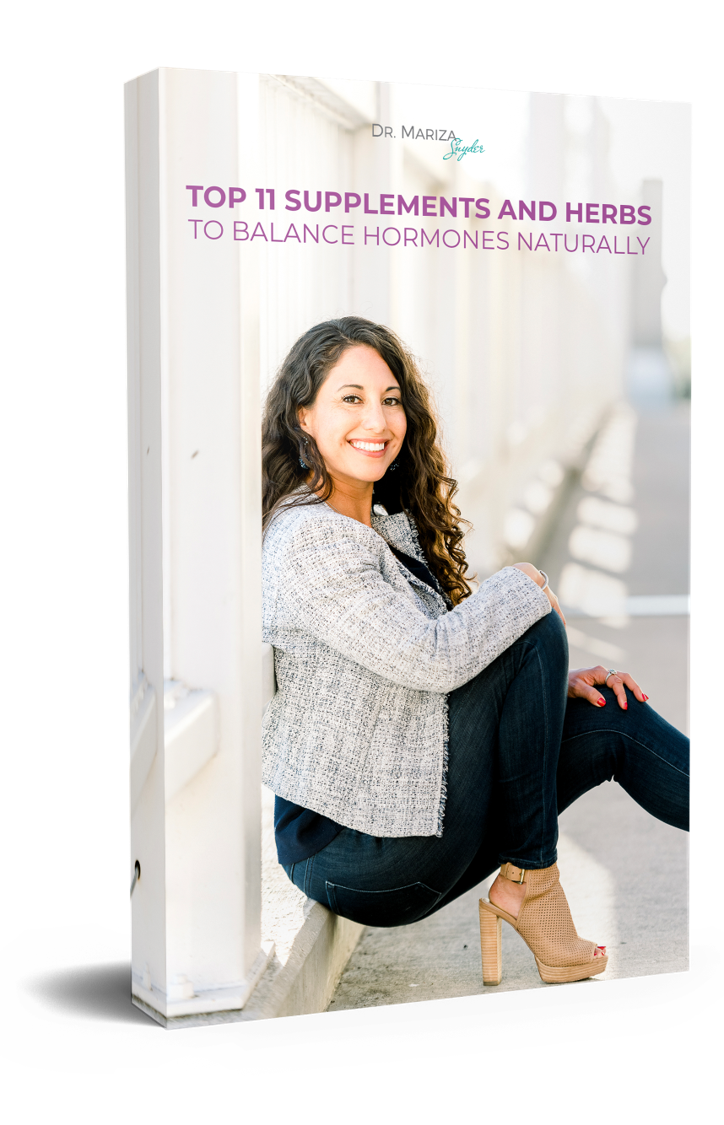
I have had to face hormone imbalance head-on.
I was fatigued, couldn’t shake extra weight, and was fighting all day long with cravings and brain fog. When I finally realized what was going on, advocated for myself, and found a doctor who would listen, I received my Hashimoto’s diagnosis.
I knew something had to change. I began taking a look into root causes that could be fueling my thyroid and hormonal issues, beginning with my gut.
Revitalizing Your Gut
When your gut is unhappy, your body won’t absorb all the nutrients from your food. It can also lead to leaky gut, brain fog, nutrient deficiencies, and many other problems — both physically and mentally. All of my research told me that loving my hormones means appreciating and loving my gut. With all of the inflammation we are dealing with — from infections, food triggers, yeast, or other issues — it is no wonder that our bodies are in chaos!
The best way to heal your gut is by making consistent, healthy food choices. Food is the one thing you have control of — Every. Single. Day.
You can make the choice to fuel your body with foods that are more beneficial to your health and optimize your body systems and well-being. While you may not notice a difference overnight, I can tell you that incorporating some of these foods into your routine will make a world of difference to your hormone health!
I had to get really intentional with my prebiotics and probiotics to heal my body. Incorporating foods with these into your diet could help get you on the road to healing as well!
Prebiotics vs. Probiotics
The health of your gut microbiome is critical to keeping a balance of hormones in your body. There is constant communication between the bacteria in your gut and your HPA axis, which regulates many of your hormones. (1) One great way you can help heal your gut is by incorporating prebiotics and probiotics into your daily diet.
You are probably familiar with probiotics since they are often highlighted everywhere from the media to food labels! Their ability to restore bacteria colonies in our gut by supplying strains of healthy bacteria does play an important role in maintaining and supporting our gut health.
But what do prebiotics do? These are foods that make your gut a happy home for bacteria. They are just as important — and they make probiotics more effective.
The interesting thing is that your body doesn’t digest prebiotics fully; instead, they feed your gut microbiome to help it thrive. Consistent prebiotic intake can help to balance your blood sugar and to reduce inflammation. (2) Prebiotics can also increase absorption of important minerals like calcium, magnesium, and iron, which are all essential to your hormone health. (3)
Prebiotic Foods
Most of these foods pack a double punch by being powerful antioxidants, which is important in fighting that inflammation in your body. To keep your gut thriving and alive with good bacteria, be sure to include these gems into your diet as your body will allow:
- Chicory, konjac, yacon, and jicama roots (4) (5) (6) (7)
- Green vegetables, especially artichokes and asparagus (8) (9)
- Dandelion greens (10)
- Garlic, onions, and leeks (11) (12) (13)
- Flaxseeds (14)
- Apples (15)
- Cocoa (Yes, you read that right. Here is your permission to incorporate some chocolate in your self care… in moderation, of course!) (16)
Whichever prebiotics you go for, just be consistent. Feeding your gut microbiome is an important part of your health journey, so including these foods daily will help keep those bacteria happy!
That said, be careful to understand the base of these foods and how they might affect your body overall. It is best not to start incorporating them all at once, especially if you are following my Hormone-Loving Foods suggestions.
For example, if you have a ragweed allergy, you want to avoid dandelion greens and chicory, as they are all from the Asteraceae/Compositae family and could cause unnecessary inflammation in your body. If you have difficulty with sulfur or excess stomach acid, be careful adding a lot of kale or garlic and onions to your diet, as they may increase GERD and indigestion.
Add them one at a time for a few days to see how your body reacts.
Probiotic Foods
While prebiotic foods feed and make a healthy environment for your gut bacteria, probiotics actually supply the bacteria that take up residence in your digestive tract. With all of these foods, it is best to make your own at home (and no, it is not as hard or scary as you may think!). This way, you can guarantee the quality of ingredients and that the healthy bacteria have not been killed off in processing.
There is a lot of hype about probiotic foods and drinks these days, so here’s my take on a few of them:
Fermented vegetables (kimchi, sauerkraut, fermented pickles, etc.)
These are the best source of probiotics to add to your diet, in my opinion. Not only do you get the fiber and nutrients from the vegetables but it is also a natural way to get the bacteria your gut needs without added sugars or potential triggers like dairy. Check out my interview with Summer Bock for more details on this and for resources for making your own!
Kefir
With even more probiotic benefits than yogurt, this is a great option because there are so many different ways to make kefir. (17) If you can tolerate dairy, you can go the traditional route using milk. If you are eliminating it from your diet, however, there are options for water- and coconut-based ferments to get you the probiotics. It is great to add to your daily smoothies to pack a punch for your gut health!
Yogurt
Yogurt is probably the most common probiotic food in America — but you need to be careful about what you are buying. Often, store-bought yogurts are packed so full of added flavors, sugar, and gums that it negates any probiotic benefit you would get. Be diligent about reading your labels and ensure it contains live, active cultures and no added sugar or unwanted ingredients if you want to use them in your diet! Or better yet — make your own using a slow cooker or pressure cooker with raw milk.
Kombucha
Although this can add probiotics to your digestive tract, be cautious. With taprooms popping up and jugs of this fizzy drink being sold at health food stores, we are overconsuming kombucha beyond its intended purpose. Because of its high amounts of sugar, it is best to keep kombucha consumption to a few tablespoons per day with meals as digestive support if you want to continue drinking it.
Bone Broth
This powerful superfood can do wonders to heal your gut and create an environment that is healthy for your microbiome. With easily digestible minerals and nutrients, drinking bone broth regularly is an easy way to give your gut a boost. When inflammation wreaks havoc on your intestines, leaving it leaky and unhealthy, the collagen in bone broth is a way to beef up your gut and restore it to its proper shape and function. (18)
Healing your gut and restoring your microbiome should be the first steps that you take to get your hormones under control. Here is a recipe that you can use to easily make bone broth at home:
Detoxifying Bone Broth
Yield: 6 quarts; serving size: 1 cup
Ingredients:
1 carcass from 4-6 lb chicken
½ lb (4-5 large) carrots, roughly chopped
½ bunch (4-5 stalks) celery, roughly chopped
1 large yellow onion, quartered
3 bay leaves
½ bunch fresh thyme
½ bunch fresh parsley
4 garlic cloves, unpeeled
2 inch piece of fresh ginger, roughly chopped
2 tablespoons raw apple cider vinegar (with the “mother”)
1 tablespoon Himalayan pink salt or Celtic gray sea salt (optional)
2 teaspoons ground turmeric
Approximately 2 gallons water
Directions:
Heat a large stock pot over high heat. Add a little oil and add the carcass, breast side up, to cook for 2-3 minutes, until lightly browned. Add remaining ingredients except turmeric and cover with water. Bring to a rolling boil, cover, and lower heat to a simmer. Cook for 24 hours, adding the turmeric in the last hour of cooking. Strain out and discard bones and vegetables. Store finished broth in glass jars for up to a week in the refrigerator. (19)
Can I Just Take a Probiotic Pill?
Wouldn’t it be lovely if all of the health benefits from prebiotics and probiotics could just come in a pill?
The truth is… Prebiotic and/or probiotic pills can be an amazing supplement for your gut and work absolute wonders as part a clean-eating regimen, but they just don’t offer the same benefits that the food sources do.
That’s why I ALWAYS recommend combining clean-eating with a quality probiotic pill, which is what I have been doing for years and would honestly never go back.
Which Probiotic is the Best?
Of all the probiotics I have tried (and that’s a LOT!), I love Just Thrive’s probiotic the most because it provides a well-rounded set of probiotics, it’s pharma-grade quality, and it acts as a powerful antioxidant. It’s also up to 1,000x better survivability than greek yogurt.
You can try it today risk-free with my special 15% off discount for a very limited time.
Simply follow the link below and enjoy a much healthier gut in just a few weeks.
Get my discount and save 15% here >>

Take Care Of You!
Your hormones need to be under control for you to feel your best. We put our guts through a lot with all the inflammatory foods that are so common in our American diet and the infections that can be hiding under the surface of symptoms.
It’s not just hormone imbalances that can result from an unhappy gut. Fatigue, weight resistance, brain fog, and so many other things can be traced back to the health of your digestive tract.
Taking steps to naturally and effectively heal yourself from the inside out is the greatest form of self-care there is. Take the time to invest in yourself and your health. You are worth it!
SUPPORT YOUR GUT HEALTH WITH A QUALITY PROBIOTIC TODAY! >>>References:
1. https://link.springer.com/chapter/10.1007/978-1-4939-0897-4_8
2. https://isappscience.org/prebiotics/
3. https://www.ncbi.nlm.nih.gov/pmc/articles/PMC3705355/
4. https://www.ncbi.nlm.nih.gov/pubmed/17445348
5. https://www.ncbi.nlm.nih.gov/pubmed/17027233
6. https://www.ncbi.nlm.nih.gov/pubmed/23709016
7. https://www.ncbi.nlm.nih.gov/pubmed/26798198
8. https://www.ncbi.nlm.nih.gov/pubmed/17445348
9. https://www.ncbi.nlm.nih.gov/pubmed/24310501/
10. https://www.ncbi.nlm.nih.gov/pubmed/19678785
11. https://www.sciencedirect.com/science/article/pii/S2213453013000311
12. https://www.ncbi.nlm.nih.gov/pubmed/12088518
13. https://www.ncbi.nlm.nih.gov/pubmed/15877886
14. https://www.ncbi.nlm.nih.gov/pubmed/25829567
15. https://www.ncbi.nlm.nih.gov/pubmed/15195908
16. https://www.ncbi.nlm.nih.gov/pubmed/21068351
17. https://www.ncbi.nlm.nih.gov/pubmed/24294220
18. https://www.ncbi.nlm.nih.gov/pmc/articles/PMC3358810/
19. Snyder, Dr. Mariza. The Essential Oils Hormone Solution. Rodale: New York, 2019.


No comments yet.